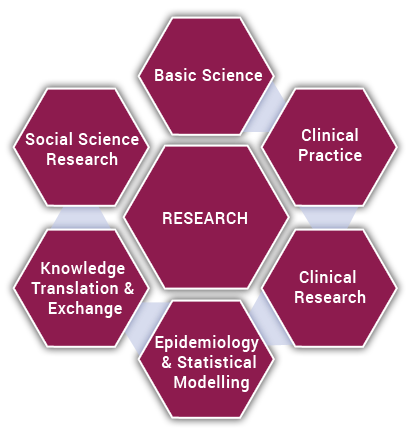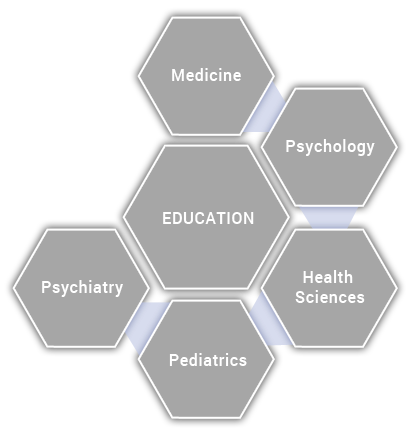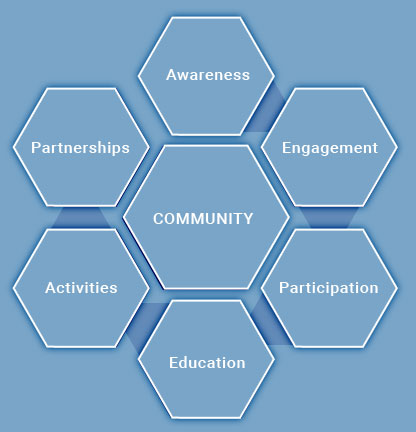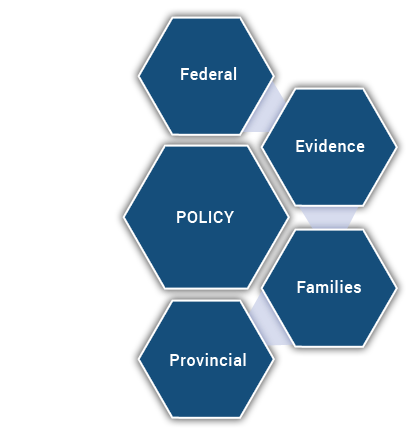Basic Science Research
Basic science research is intended to result in a gain in knowledge in a particular field, which extends understanding of that topic and provides a way of solving practical problems. One example might be how brain cells communicate with each other in Autistic persons.
- Dr. Terry Bennett
- Dr. John Connolly
- Dr. Margaret Fahnestock
- Dr. Jane Foster
- Dr. Geoffrey Hall
- Dr. Diana Parvinchi
- Dr. Karun Singh
- Dr. Peter Szatmari
- Dr. Stephanie Lavoie
- Dr. Irene Drmic
- Dr. Mackenzie Salt
- Dr. Katrina Choe
Clinical Practice
Clinical practice refers to the activities carried out in a medical setting with practitioners’ patients. Some of these are based on guidelines that specify how diagnosis and treatment should be carried out in a particular condition. Clear and strict guidelines around Autism diagnosis ensures that the proper support and care needs of Autistic individuals are provided.
- Dr. Kerry Boyd
- Dr. Briano Di Rezze
- Dr. Nick Kates
- Dr. Olaf Kraus de Camargo
- Dr. William Mahoney
- Dr. Diana Parvinchi
- Dr. Peter Rosenbaum
- Dr. Noam Soreni
- Dr. Peter Szatmari
- Dr. Caroline Roncadin
- Colleen Fotheringham-Anderson
- Dr. Stephanie Lavoie
- Dr. Ronit Mesterman
- Dr. Irene Drmic
- Dr. Mohammad Zubairi
- Lorraine Hoult
- Dr. Julia Frei
- Alina Kislenko
- Dr. Olivia Ng
- Holly Augerman
- Dr. Rebecca Shine
- Dr. Elisabetta Trinari
Clinical Research
Clinical research determines whether or not medications, devices, or diagnostic methods are effective and safe for humans. This includes research being carried out by MacART members who are testing medications that can be part of a care and support plan for some Autistic persons’ needs.
- Dr. Terry Bennett
- Dr. Briano Di Rezze
- Dr. Stelios Georgiades
- Dr. Nick Kates
- Dr. Olaf Kraus de Camargo
- Dr. Peter Rosenbaum
- Dr. Noam Soreni
- Dr. Caroline Roncadin
- Dr. Stephanie Lavoie
- Dr. Stephen Gentles
- Dr. Irene Drmic
- Dr. Julia Frei
- Alina Kislenko
- Dr. Olivia Ng
- Irene O’Connor
- Areeba Sharafuddin
- Dr. Rebecca Shine
- Dr. Elisabetta Trinari
Epidemiology & Statistical Modelling
Epidemiology is the study of how many people in a given population have a specific condition, what factors are related to its cause, and what treats or controls it. A statistical model is a representation of reality using numbers and other data derived from research. Models can be used to simulate reality. By changing a model using different characteristics, different outcomes for Autistic children could be predicted.
- Dr. Terry Bennett
- Dr. Joseph Beyene
- Dr. Eric Duku
- Dr. Stelios Georgiades
- Dr. Peter Szatmari
- Dr. Paul McNicholas
- Dr. Ayesha Siddiqua
- Lorraine Hoult
- Dr. Yun-Ju (Claire) Chen
- Dr. Elisabetta Trinari
Knowledge Translation & Exchange
Knowledge translation and exchange (KTE) is a collaborative process. The goal of MacART’s KTE core is to involve all stakeholders in each step of the research cycle. Community members have been asking for research that addresses their real-world problems and MacART is committed to responding to their ask. Findings of research will be shared with parents, Autistic persons, other researchers, clinicians, educators, and policymakers through consultation, conferences, and our website. This KTE process aims to advance autism care through meaningful research by encouraging the use of evidence to inform clinical practice and policy.
- Dr. Briano Di Rezze
- Dr. Jane Foster
- Dr. Stelios Georgiades
- Dr. Olaf Kraus de Camargo
- Dr. Vivian Lee
- Dr. Stephen Gentles
- Dr. Linda Nguyen
- Lorraine Hoult
- Dr. Mackenzie Salt
- Alina Kislenko
- Dr. Olivia Ng
- Holly Augerman
Social Science Research
Social science research examines those aspects of a family’s situation that can have negative or positive influences on child development. A family’s income, the composition of the family, the services and supports available to them, the neighbourhood and community in which they live, their ethnic/cultural background, and their family history are all factors that can influence Autistic children’s outcomes.
- Dr. Ellen Badone
- Dr. Terry Bennett
- Dr. Eric Duku
- Dr. Kathy Georgiades
- Dr. Stelios Georgiades
- Dr. Magdalena Janus
- Dr. Nick Kates
- Dr. Vivian Lee
- Dr. Peter Szatmari
- Dr. Stephen Gentles
- Dr. Ayesha Siddiqua
- Dr. Linda Nguyen
- Dr. Mohammad Zubairi
- Lorraine Hoult
- Rita Jezrawi
- Dr. Yun-Ju (Claire) Chen
- Dr. Jean-Eric Tarride




